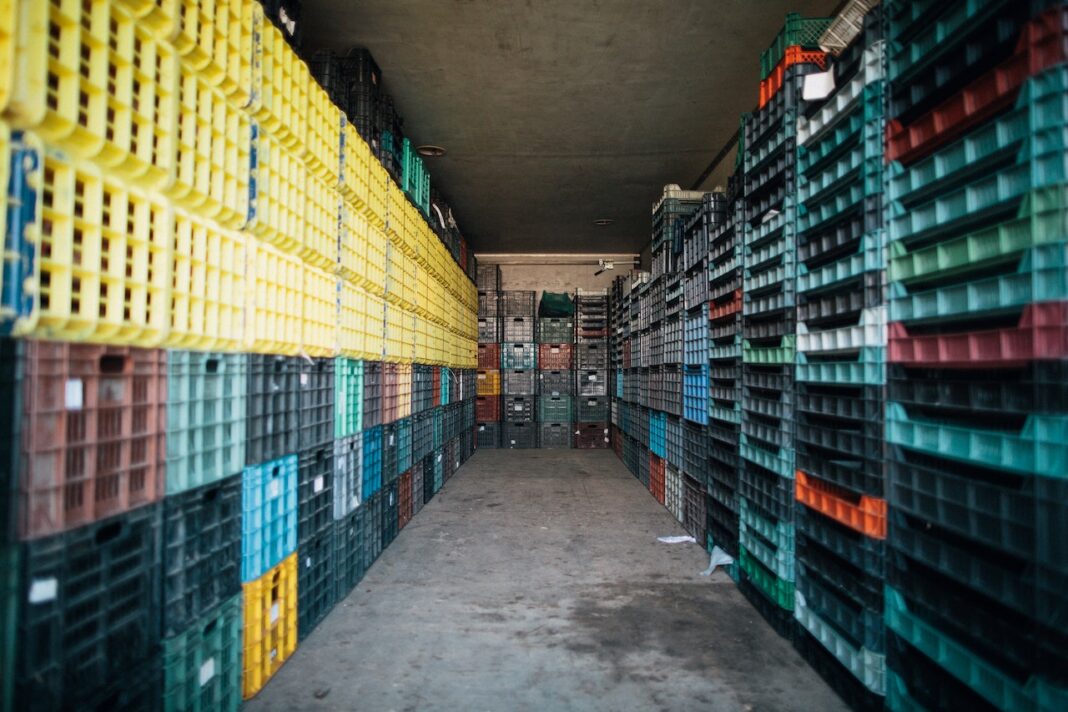Globally, thousands of tonnes of transit based packaging is disposed of every year, hence more and more logistics companies are opting for reusable, returnable transit packaging (RTP) to replace single-trip disposable packaging.
Future Market Insights states that the global pallet pooling market is estimated to reach US$12.9B by 2032. With manufacturing expanding worldwide, the demand for pallet pooling solutions across various industries such as FMCG, pharmaceuticals, and more has increased. The introduction of innovative returnable pallet crates shows the industry is evolving and looking for new and beneficial methods of operation, with the new returnable pallet crates reducing waste and boosting efficiency as they can be reused multiple times.
Returnable pallet pooling is a logistics solution that involves the use of reusable pallets and pallet crates in the supply chain. Rather than using disposable wooden pallets, which are often used once and then discarded, returnable pallet pooling solutions allow businesses to use pallets that are designed to be used multiple times. These pallets can be returned to a central location after use and then redistributed to other businesses in the supply chain.
There are several key benefits to returnable pallet pooling solutions:
Cost savings: Returnable pallet pooling can help businesses to save money on pallet purchases, storage, and maintenance. By using pallets that are designed to be reused, businesses can reduce their expenses on disposable and single use wooden pallets and eliminate the need for frequent pallet purchases.
Sustainability: Returnable pallet pooling helps to reduce waste and improve sustainability in the supply chain. Reusable pallets can be used hundreds or even thousands of times, significantly reducing the environmental impact of pallet production and disposal. This can help businesses to meet sustainability goals and reduce their carbon footprint. This is an innovative and sustainable way in which the industry is responding to new methods of operation.
Improved efficiency: Returnable pallet pooling can also improve the efficiency of the supply chain. With reusable pallets, businesses can better track and manage the movement of goods, reducing the risk of lost or damaged pallets. This can help to streamline operations and improve the accuracy of inventory management.
Enhanced safety: Returnable pallets are often made from materials that are stronger and more durable than disposable wooden pallets. They are designed and manufactured to be more durable and robust, aiding in lowering the risk of damage to products during transit. It is also possible to wash these hygienically and return these back to the loop. This can help to reduce the risk of pallet failure and improve safety in the supply chain.
Customisation: Returnable pallets can also be customised to meet the specific needs of a business. For example, they can be designed to fit specific types of goods or to accommodate the unique requirements of a particular supply chain. This personalisation offers excellent new opportunities for businesses to benefit from.
There are several different models for returnable pallet pooling, including in-house and third-party solutions. In-house returnable pallet pooling involves a company
managing its own pool of reusable pallets, while third-party returnable pallet
pooling involves a separate company managing the pool of pallets for multiple businesses.
In-house returnable pallet pooling can be a good solution for companies with a large volume of pallet usage and a consistent supply chain. It allows for more control over the pallets and can be more cost-effective in the long run. However, it requires a significant investment in pallet management systems and can be more challenging to implement and maintain. It requires a team to manage it along with solid processes and software solutions to track it constantly.
Third-party returnable pallet pooling is a more flexible option for businesses with fluctuating pallet usage or a more complex supply chain. It allows companies to access a larger pool of pallets and share the cost with other businesses, without the need for significant upfront investment or for ongoing management via way of a dedicated team or software systems etc. There’s some short term up front costs and it might require some loss of control over the pallets in your pool. Ultimately, the best returnable pallet pooling solution will depend on the specific needs and goals of a business. By carefully considering factors such as volume of pallet usage, supply chain complexity, and sustainability goals, businesses can choose the returnable pallet pooling model that best fits their needs.
In conclusion, returnable pallet pooling is a logistics solution that allows businesses to use reusable pallets in the supply chain, reducing costs, waste, and environmental impact. It can also improve the efficiency of the supply chain and enhance safety. There are several different models for returnable pallet pooling, including in-house and third-party options, and the best solution will depend on the specific needs of a business.



